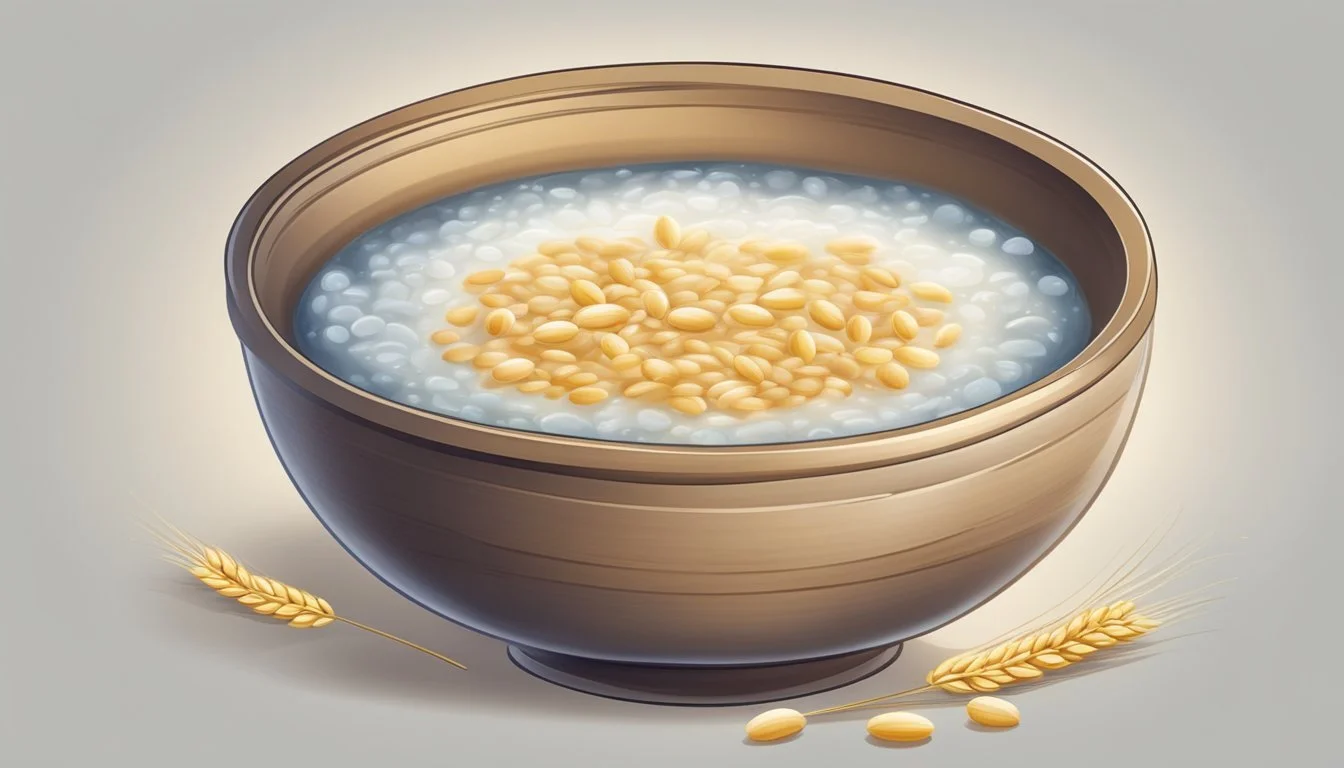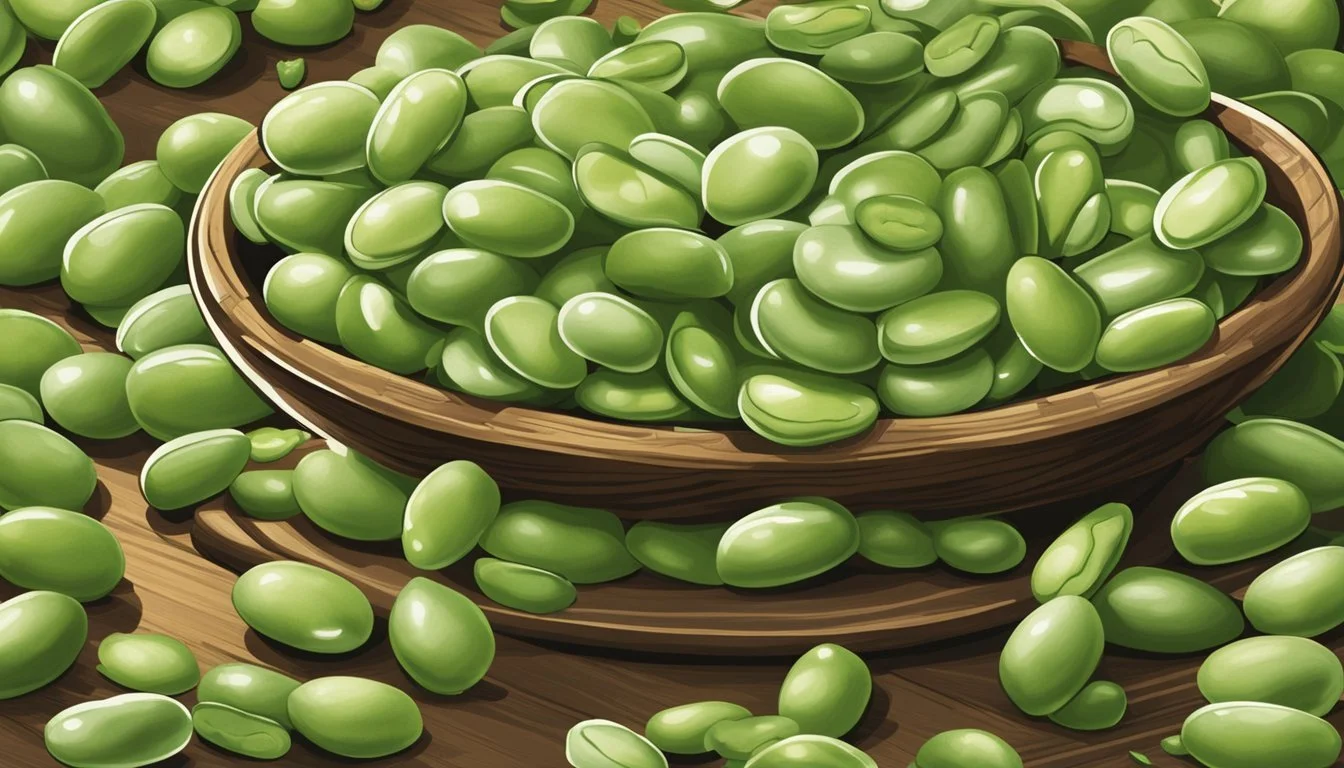10 Nutrient-Dense Foods High in Soluble Fiber for Gut Health
Top Choices for a Healthier Diet
Soluble fiber plays a crucial role in maintaining overall health by promoting digestive wellness and helping to manage cholesterol levels. Foods rich in soluble fiber can be found in various categories including fruits, vegetables, grains, and legumes, each contributing to a balanced diet.
What makes soluble fiber valuable is its ability to absorb water and form a gel-like consistency, which aids in slowing down digestion and enhancing nutrient absorption. Additionally, incorporating these foods into daily meals can lead to improved heart health and better blood sugar control, making them essential for anyone looking to optimize their diet.
1) Oats
Oats stand out as one of the top sources of soluble fiber. Particularly, they contain beta-glucan, a type of soluble fiber known for its health benefits. This fiber type aids in reducing cholesterol levels, thus supporting heart health.
A typical serving of oats, such as a half-cup of cooked oatmeal, provides about 4 grams of fiber. Of this, a significant portion is soluble fiber.
Oats contribute not only to heart health but also play a role in moderating blood sugar levels. The soluble fiber slows the digestion and absorption of carbohydrates, leading to more stable blood sugar levels.
Many people enjoy oats in various forms, from oatmeal to granola. This versatility makes it easy to incorporate oats into the diet. Whether eaten as a warm breakfast or added to snacks, oats provide a valuable boost of soluble fiber.
Those opting for oats might also benefit from their associated vitamins and minerals. Oats are a good source of magnesium, phosphorus, and thiamine, among others. This nutrient profile adds to their status as a healthy food choice.
2) Barley
Barley is a nutrient-rich grain that contains significant amounts of soluble fiber. This fiber comes in the form of beta-glucans, which are known to help lower LDL cholesterol levels. Including barley in the diet can contribute to better heart health, thanks to its ability to moderate cholesterol.
A half-cup serving of hulled barley offers 16 grams of fiber, making it an excellent choice for those looking to increase their soluble fiber intake. It also provides 12 grams of protein and just 2 grams of fat, adding to its nutritional benefits.
Barley’s soluble fiber also aids in regulating blood sugar levels. By slowing the absorption of sugar into the bloodstream, it helps maintain steady glucose levels, which is beneficial for individuals managing diabetes.
The prebiotic properties of barley support gut health too. The beta-glucans and inulin found in barley act as food for healthy gut bacteria, fostering a thriving digestive system. This can improve overall digestive health and reduce issues related to bowel movements.
Barley can be easily incorporated into a variety of dishes. It can be added to soups, stews, salads, and even baked goods. Cooking barley is straightforward: simply boil it until it reaches the desired tenderness.
3) Psyllium Husk
Psyllium husk is derived from the seeds of Plantago ovata, a plant native to India. It is known for being a potent source of soluble fiber. This type of fiber absorbs water to form a gel-like substance, aiding in digestive health and promoting regular bowel movements.
Psyllium husk can help manage blood sugar levels. When consumed with carbohydrate-rich meals, it slows down carbohydrate breakdown, effectively moderating blood glucose spikes. This makes it particularly beneficial for individuals with diabetes.
One of the most significant benefits of psyllium husk is its ability to lower cholesterol levels. Soluble fiber binds to cholesterol in the digestive system, helping to remove it from the body. This can contribute to better cardiovascular health over time.
In addition to its health benefits, psyllium husk is versatile in cooking and baking. It can be added to smoothies or used as a thickener in soups and sauces. In baking, it serves as a binder and can enhance the fiber content of various baked goods.
4) Black Beans
Black beans are a rich source of soluble fiber. One cup of cooked black beans contains approximately five grams of soluble fiber. This makes them an excellent choice for those looking to increase their fiber intake.
In addition to their high fiber content, black beans are also packed with important nutrients. They are a good source of protein, making them a valuable addition to a plant-based diet.
Black beans also provide essential vitamins and minerals. They are particularly high in folate, with a half-cup serving providing around 18% of the daily value. Folate is crucial for producing red blood cells and preventing neural tube defects during pregnancy.
Iron is another nutrient found in black beans. A half-cup serving offers 13% of the daily value for iron, which supports oxygen transport and overall energy levels. Including black beans in meals can thus help in maintaining nutritional balance.
The versatility of black beans means they can be easily added to a variety of dishes, from salads to soups to main courses. Their relatively mild flavor complements many cuisines, making them a flexible and nutritious food choice.
5) Brussels Sprouts
Brussels sprouts are a nutritious vegetable high in soluble fiber. They help improve digestion by acting as a prebiotic that feeds beneficial gut bacteria. This process supports overall gut health.
A single cup of boiled Brussels sprouts contains around 11 grams of carbohydrates, with a significant portion being soluble fiber. This dietary fiber helps stabilize blood sugar levels by slowing down digestion.
Besides soluble fiber, Brussels sprouts are rich in vitamins K and C. These vitamins play essential roles in bone health and immune function. The combination of fiber and nutrients makes Brussels sprouts a versatile addition to a healthy diet.
For those concerned about digestive discomfort, even people with sensitive systems can often tolerate small portions. This allows them to benefit from the vegetable’s high fiber content without adverse effects.
Adding Brussels sprouts to meals can be simple. They can be roasted, steamed, or added to various dishes, providing both taste and health benefits. Their ease of preparation and rich fiber content make Brussels sprouts an excellent choice for those looking to boost their intake of soluble fiber.
6) Sweet Potatoes
Sweet potatoes are a nutritious root vegetable known for their high content of soluble fiber.
A medium-sized sweet potato provides about 3 grams of fiber. This fiber aids in digestion and helps maintain stable blood sugar levels.
Rich in essential nutrients, sweet potatoes are high in vitamin A, potassium, and B vitamins. Including them in a balanced diet contributes to overall health.
Sweet potatoes are versatile and can be enjoyed baked, mashed, or roasted, making it easy to incorporate them into various meals.
Their natural sweetness and nutritional value make sweet potatoes a popular choice for those looking to increase their fiber intake.
7) Lima Beans
Lima beans are an excellent source of soluble fiber. They are known for their high nutritional content, including a variety of vitamins and minerals essential for health.
One cup (170 grams) of cooked lima beans provides a substantial amount of soluble fiber. This makes them an effective addition to a diet focused on heart health and digestive wellness.
The soluble fiber in lima beans helps reduce LDL cholesterol levels. This type of cholesterol is often referred to as "bad" cholesterol, and lowering it can improve cardiovascular health.
Apart from fiber, lima beans are also rich in protein and contain minimal saturated fats. This makes them a heart-healthy option that can be easily incorporated into various dishes.
In addition to their health benefits, lima beans are versatile and can be used in soups, salads, and stews. Their mild flavor allows them to blend well with a variety of ingredients.
For those looking to increase their fiber intake, lima beans are a valuable and nutritious option. Their high fiber content and other nutrients make them a beneficial component of a balanced diet.
8) Avocados
Avocados are a notable source of soluble fiber, contributing significantly to daily fiber intake. A 100-gram portion, roughly half a large avocado, provides about 7 grams of fiber, helping to promote digestive health.
Including avocados in a diet can aid in maintaining healthy cholesterol levels. The soluble fiber in avocados binds to cholesterol in the digestive system, preventing it from being absorbed and thus lowering overall cholesterol levels.
Beyond fiber, avocados offer a rich array of nutrients. They are high in healthy fats, particularly monounsaturated fats, which support heart health. Avocados also contain vitamins E and C, potassium, and folate.
Due to their high fiber content, avocados can contribute to a feeling of fullness, which may help with weight management efforts. The fiber slows down digestion, providing a steady release of energy.
The versatility of avocados makes them easy to incorporate into various meals. They can be added to salads, blended into smoothies, or simply spread on toast. This flexibility, along with their nutritional benefits, makes avocados a valuable addition to a fiber-rich diet.
9) Apples
Apples are a popular fruit known for their high soluble fiber content. A medium-sized apple with the skin on contains about 4 grams of fiber. This fiber is predominantly pectin, a type of soluble fiber that offers various health benefits.
Soluble fiber in apples can help reduce cholesterol levels. This can contribute to better heart health by binding with cholesterol in the digestive system and removing it from the body.
Eating apples may also aid in regulating blood sugar levels. The soluble fiber slows down digestion and the absorption of sugar, making it beneficial for people managing diabetes.
Apples are also low in calories, making them a weight-loss-friendly option. The high fiber content helps promote feelings of fullness, which can reduce overall calorie intake.
10) Oranges
Oranges are a well-known source of vitamin C, but they also provide a decent amount of soluble fiber. A medium-sized orange contains around 2 to 3 grams of fiber, with a significant portion being soluble.
This soluble fiber helps in maintaining healthy cholesterol levels. It also aids in stabilizing blood sugar levels, making oranges a good choice for those managing diabetes.
Beyond their fiber content, oranges offer additional health benefits through their antioxidants and other essential nutrients. Eating them regularly can contribute to overall digestive health and wellness.
Incorporating oranges into one's diet can be easy and versatile. They can be eaten alone, added to salads, or even used in cooking and baking. This makes them a convenient option for boosting soluble fiber intake.
Health Benefits of Soluble Fiber
Soluble fiber offers a variety of health advantages, particularly for digestive health, heart health, and blood sugar control. These benefits make it an essential component of a balanced diet.
Digestive Health
Soluble fiber helps promote regular bowel movements by forming a gel-like substance in the gut.
This can slow down digestion, contributing to a feeling of fullness. It also supports beneficial gut bacteria, which aid in digestion and nutrient absorption.
Soluble fiber is found in foods like oats, beans, and certain fruits, which can also help prevent constipation and reduce symptoms of irritable bowel syndrome (IBS). Regular intake contributes to maintaining a healthy digestive tract.
Heart Health
Soluble fiber has been shown to lower levels of LDL or "bad" cholesterol.
It helps reduce the risk of heart disease by absorbing excess cholesterol in the digestive system and excreting it. Additionally, soluble fiber can help lower blood pressure and reduce inflammation, contributing to overall cardiovascular health.
Incorporating foods like flaxseed, oats, and beans into your diet can assist in maintaining heart health.
Blood Sugar Control
Soluble fiber can slow down the absorption of sugar, helping to stabilize blood glucose levels.
This is particularly beneficial for people with diabetes or those at risk of developing the condition. The fiber forms a gel-like substance that slows the digestion of carbohydrates, preventing spikes in blood sugar.
Foods high in soluble fiber, such as legumes and certain vegetables, can promote insulin sensitivity, making it easier to manage blood sugar levels effectively.
Incorporating Soluble Fiber Into Your Diet
Eating foods high in soluble fiber can significantly improve digestive health and help manage weight. The following sections offer practical tips for meal planning, cooking, and recipes to enhance your intake of soluble fiber.
Meal Planning Tips
Incorporating soluble fiber into daily meals requires some thoughtful planning. Start by choosing breakfast options like oatmeal or chia pudding. Both items are high in soluble fiber and make for a hearty, nutritious start to the day.
For lunch and dinner, aim to include at least one serving of beans or legumes. Black beans, lentils, and chickpeas are excellent choices. Pair these with vegetables like Brussels sprouts or carrots that also contain soluble fiber.
Snacks can be an opportunity, too. Keep foods like apples, oranges, and pears handy. These fruits are not only convenient but also rich in soluble fiber. Include at least one of these snacks in your daily routine.
Cooking Techniques
Maximize soluble fiber content by employing specific cooking techniques. For instance, soaking beans overnight before cooking can make them easier to digest and enhance their fiber content.
Use whole grains instead of refined grains. Replace white flour with whole grain flour in your recipes. This not only boosts soluble fiber but also adds nutritional value.
Blending is another great method. When making smoothies, add ingredients like flaxseeds or psyllium husk. These blend well and provide a significant boost of soluble fiber without altering the taste.
When cooking soups and stews, include a variety of fiber-rich foods. Adding barley or legumes can make your meals heartier and more nutritious.
Recipe Ideas
Here are some simple yet effective recipes to help you add more soluble fiber into your diet:
Morning Oatmeal: Combine rolled oats, chia seeds, almond milk, and top with berries and a drizzle of honey.
Lentil Soup: Cook lentils with chopped carrots, celery, onions, and garlic. Season with cumin and pepper for flavor.
Chia Seed Pudding: Mix chia seeds, coconut milk, and a splash of vanilla extract. Refrigerate overnight and top with fresh fruit.
Black Bean Salad: Combine cooked black beans, corn, diced tomatoes, red onions, and cilantro. Toss with a lime-cilantro dressing for a refreshing and fiber-rich meal.
These recipes are easy to prepare and ensure that you get a healthy dose of soluble fiber with each serving.






